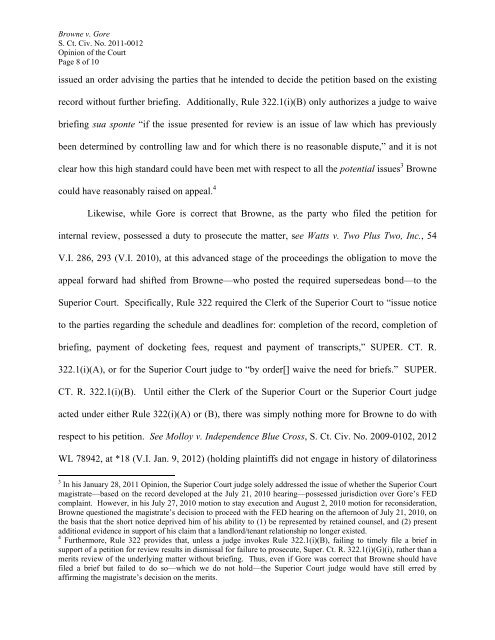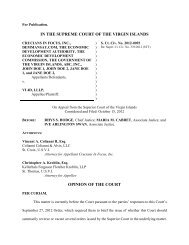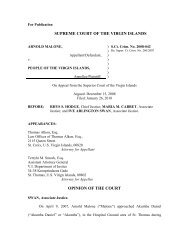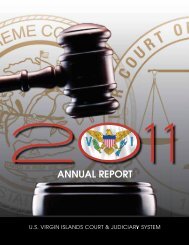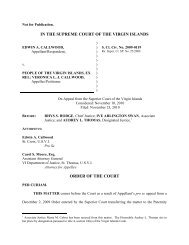IN THE SUPREME COURT OF THE VIRGIN ISLANDS OPINION OF ...
IN THE SUPREME COURT OF THE VIRGIN ISLANDS OPINION OF ...
IN THE SUPREME COURT OF THE VIRGIN ISLANDS OPINION OF ...
Create successful ePaper yourself
Turn your PDF publications into a flip-book with our unique Google optimized e-Paper software.
Browne v. GoreS. Ct. Civ. No. 2011-0012Opinion of the CourtPage 8 of 10issued an order advising the parties that he intended to decide the petition based on the existingrecord without further briefing. Additionally, Rule 322.1(i)(B) only authorizes a judge to waivebriefing sua sponte “if the issue presented for review is an issue of law which has previouslybeen determined by controlling law and for which there is no reasonable dispute,” and it is notclear how this high standard could have been met with respect to all the potential issues 3 Brownecould have reasonably raised on appeal. 4Likewise, while Gore is correct that Browne, as the party who filed the petition forinternal review, possessed a duty to prosecute the matter, see Watts v. Two Plus Two, Inc., 54V.I. 286, 293 (V.I. 2010), at this advanced stage of the proceedings the obligation to move theappeal forward had shifted from Browne—who posted the required supersedeas bond—to theSuperior Court. Specifically, Rule 322 required the Clerk of the Superior Court to “issue noticeto the parties regarding the schedule and deadlines for: completion of the record, completion ofbriefing, payment of docketing fees, request and payment of transcripts,” SUPER. CT. R.322.1(i)(A), or for the Superior Court judge to “by order[] waive the need for briefs.” SUPER.CT. R. 322.1(i)(B). Until either the Clerk of the Superior Court or the Superior Court judgeacted under either Rule 322(i)(A) or (B), there was simply nothing more for Browne to do withrespect to his petition. See Molloy v. Independence Blue Cross, S. Ct. Civ. No. 2009-0102, 2012WL 78942, at *18 (V.I. Jan. 9, 2012) (holding plaintiffs did not engage in history of dilatoriness3 In his January 28, 2011 Opinion, the Superior Court judge solely addressed the issue of whether the Superior Courtmagistrate—based on the record developed at the July 21, 2010 hearing—possessed jurisdiction over Gore’s FEDcomplaint. However, in his July 27, 2010 motion to stay execution and August 2, 2010 motion for reconsideration,Browne questioned the magistrate’s decision to proceed with the FED hearing on the afternoon of July 21, 2010, onthe basis that the short notice deprived him of his ability to (1) be represented by retained counsel, and (2) presentadditional evidence in support of his claim that a landlord/tenant relationship no longer existed.4 Furthermore, Rule 322 provides that, unless a judge invokes Rule 322.1(i)(B), failing to timely file a brief insupport of a petition for review results in dismissal for failure to prosecute, Super. Ct. R. 322.1(i)(G)(i), rather than amerits review of the underlying matter without briefing. Thus, even if Gore was correct that Browne should havefiled a brief but failed to do so—which we do not hold—the Superior Court judge would have still erred byaffirming the magistrate’s decision on the merits.


